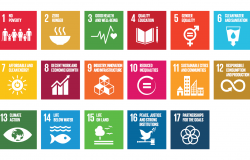Global Challenges Summit 2019 Highlights Role of North East

Elle Young reports on discussions at the fourth annual Global Challenges Summit, including the role that the North East can play as a ‘global development powerhouse for collaborative research’.
Newcastle University hosted the fourth annual Global Challenges Summit in Newcastle. The Global Challenges Academy at Newcastle University works in close partnership with Northumbria and Durham Universities, in supporting the United Nations Sustainable Development Goals (SDGs) to seek peace and prosperity for all people and the planet by 2030.
Fostering research and international partnerships to realise the SDGs, are the core values of the Global Challenges Academy, which encourages challenge-based and regional focused research networks to find evidence-based solutions for the world’s most pressing development challenges. The integrated ‘web’ of challenges that impact society and environment, inevitably require global partnerships to achieve these goals together.
The Summit aimed to explore the collaboration opportunities that are involved with international development and global challenges research within the North East and beyond, whilst reinforcing the overarching theme of ‘innovation and creativity for international development’.
International collaborations essential to success
The Summit started with ‘A good use of international aid?: What can global challenges research realistically achieve?’. Chaired by Professor Matt Baillie Smith from Northumbria University, Dr Renu Khosla from the Centre for Urban and Regional Excellence, Dr Ravinder Kaur, IIT Delhi and Professor Shekhar Seshadri from the National Institute of Mental Health and Neurosciences in India. The session explored the difficulties involved in defining global challenges. Discussion acknowledged the significance of collaboration between universities to research and build solutions to address the complexities of global challenges.
Progressing into the Summit’s facilitated networking session, the interactive nature of the project enabled academics, NGO representatives and university students alike to discuss their understandings of the SDGs. The session emphasised ‘collaboration’ as a key component of both the activity but also working to achieve the global goals. Interesting insights emerged from the student panel, which aimed to explore how ‘new voices’ are able to engage with the global challenges research agenda to take appropriate action.
An important message emerged from Durham University Postgraduate student Nyaboke P. Omwega in her presentation on ‘Transport as Gendered Employment in Sub-Saharan Africa’, that reinforces gender equality as the key to sustainable development.
‘People-centred’ approach
‘Reflections on the Global Challenges Research Fund’ drew on perspectives from leading academics of Durham, Northumbria, Newcastle and Jadavpur universities. It also celebrated the roles and intentions of professional services within university institutions that enable research into global challenges. The session encouraged panel members and the audience to think about ‘our impact’ and accountability in global challenges research.
Professor Louise Bracken, Director of the Institute of Hazard, Risk and Resilience at Durham University, added that ‘we have to think about scales of successes and learn from our failures’. Nonetheless, whilst this session highlighted the relevance of interdisciplinary and co-production of knowledge as an essential component of the global challenges research agenda, a crucial question remains regarding ‘who assesses our successes’.
As the day started to draw to a close, Dr Alison Vipond, Lorna Wilson and Sumana Banerjee discussed the re-occurring theme of the day: ‘people and partnerships’ within the global challenges discipline. Alison explored the responsibility of professional services and academic staff in order to bring a ‘people-centred approach’ that enables people to work together, establish links within communities and ensure representation and engagement with research.
Sumana highlighted the importance of including young people in the exploration of global challenges, suggesting that ‘we need more informal outputs for research that reach out to a wide variety of audiences, especially students’.
For the ‘Pecha-Kucha’ session, there where thirteen participants from the collection of universities who each gave three-minute presentations based on global challenges research. During a tense 40 minutes, we watched a wealth of presentations, from Hannah Brown discussing her research on ‘Epidemics and Disease Control in Africa’, ‘International Migration and Inclusive Development in India’ from Dr Steve Taylor, through to Dr Joanna Allan’s presentation on ‘Powering Conflict, Fuelling Resistance, Resisting Energy Colonialism in Western Sahara’, just to name a few.
Global development powerhouse
Reflecting on what was a successful day at the Global Challenges Summit, Professor Matt Baillie concluded that the ‘Global Challenges Research Fund helps us work in new, collaborative ways within and beyond the region’. The echo of ‘people and partnerships’ as an underlying theme of the Summit, reinforces the requirement to expand on existing North East relationships that work across sectors, disciplines and national borders in order to create cutting-edge, impactful research that has the capacity to change the world for the better.
The Summit truly acknowledged the North East as a ‘global development powerhouse for collaborative research’ emphasised by Dr Elisa Lawson and Professor Pauline Dixon, the co-directors of the Global Challenges Academy. The North East is undoubtedly a force to be reckoned with, now and in the future for the Global Challenges Research Agenda. It will certainly be interesting to see progress over the next 12 months and new lessons from the 2020 Global Challenges Summit.
Conversations about the 2019 Global Challenges Summit can be followed online through the hashtag #GCSummitNE19 on Twitter. You can also join the conversation on Twitter through #NCLGlobalChallenges, or follow @NCLGCA. For more information about global challenges and international development research by Newcastle University, please visit the Global Challenges Academy website: https://www.ncl.ac.uk/globalchallenges/.
Elle Young, MA student in International Development & Education, Newcastle University.
This first appeared on the University of Newcastle's Sustainable Development blog.


